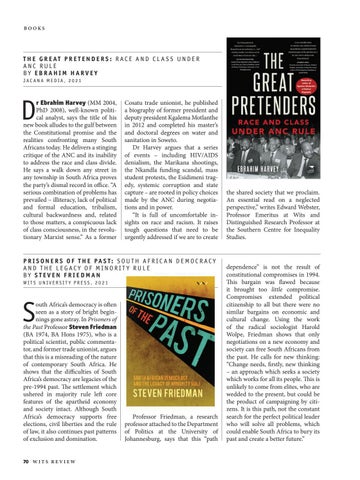BOOKS
THE GREAT PRETENDERS: RACE AND CL ASS UNDER ANC RULE BY EBRAHIM HARVEY JACANA MEDIA, 2021
D
r Ebrahim Harvey (MM 2004, PhD 2008), well-known political analyst, says the title of his new book alludes to the gulf between the Constitutional promise and the realities confronting many South Africans today. He delivers a stinging critique of the ANC and its inability to address the race and class divide. He says a walk down any street in any township in South Africa proves the party’s dismal record in office. “A serious combination of problems has prevailed – illiteracy, lack of political and formal education, tribalism, cultural backwardness and, related to those matters, a conspicuous lack of class consciousness, in the revolutionary Marxist sense.” As a former
Cosatu trade unionist, he published a biography of former president and deputy president Kgalema Motlanthe in 2012 and completed his master’s and doctoral degrees on water and sanitation in Soweto. Dr Harvey argues that a series of events – including HIV/AIDS denialism, the Marikana shootings, the Nkandla funding scandal, mass student protests, the Esidimeni tragedy, systemic corruption and state capture – are rooted in policy choices made by the ANC during negotiations and in power. “It is full of uncomfortable insights on race and racism. It raises tough questions that need to be urgently addressed if we are to create
P R I S O N E R S O F T H E PA S T: S O U T H A F R I C A N D E M O C R AC Y AND THE LEGACY OF MINORIT Y RULE BY STEVEN FRIEDMAN WITS UNIVERSIT Y PRESS, 2021
S
outh Africa’s democracy is often seen as a story of bright beginnings gone astray. In Prisoners of the Past Professor Steven Friedman (BA 1974, BA Hons 1975), who is a political scientist, public commentator, and former trade unionist, argues that this is a misreading of the nature of contemporary South Africa. He shows that the difficulties of South Africa’s democracy are legacies of the pre-1994 past. The settlement which ushered in majority rule left core features of the apartheid economy and society intact. Although South Africa’s democracy supports free elections, civil liberties and the rule of law, it also continues past patterns of exclusion and domination. 70 W I T S R E V I E W
Professor Friedman, a research professor attached to the Department of Politics at the University of Johannesburg, says that this “path
the shared society that we proclaim. An essential read on a neglected perspective,” writes Edward Webster, Professor Emeritus at Wits and Distinguished Research Professor at the Southern Centre for Inequality Studies.
dependence” is not the result of constitutional compromises in 1994. This bargain was flawed because it brought too little compromise. Compromises extended political citizenship to all but there were no similar bargains on economic and cultural change. Using the work of the radical sociologist Harold Wolpe, Friedman shows that only negotiations on a new economy and society can free South Africans from the past. He calls for new thinking: “Change needs, firstly, new thinking – an approach which seeks a society which works for all its people. This is unlikely to come from elites, who are wedded to the present, but could be the product of campaigning by citizens. It is this path, not the constant search for the perfect political leader who will solve all problems, which could enable South Africa to bury its past and create a better future.”
